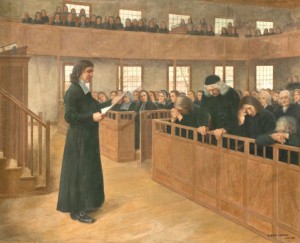The Sorrows of January
In 1671, in the town of Groton in Massachusetts Bay, a teenaged girl was seen mumbling to herself, walking clumsily through the small frontier community. When approached by her family and neighbors, Elizabeth Knapp shrugged off their concerns, making excuses for her odd behavior.
The Reverend Samuel Willard witnessed his house servant Elizabeth’s outbursts of violent shrieks and uncontrolled laughter. A Puritan clergyman and theologian, Willard had arrived in Groton some 8 years earlier.
Married to a minister’s daughter and father to several children, Willard was a respected member of the community. He was a fine man who had produced a fine Puritan family. He was devoted to the church and its tenets, and believed strongly in the marriage of church and state. His life was vastly different from his servant Elizabeth’s and, as he looked out on this suffering child, he feared that evil had entered into her heart.
Elizabeth blamed her diabolical afflictions on a good woman who lived nearby. But the townspeople of Groton could not be persuaded that witchcraft was afoot and their devout minister would not be swayed by the trickery of the devil. Without reliable evidence that witchcraft was to blame, Willard chose to seek Elizabeth’s redemption through private council rather than bring the case before the magistrate. Willard’s last notes on the matter say that Elizabeth confessed that the devil had deluded her. She had been discontent with her status and lured by the devil’s false promises.
For Samuel Willard, however, this was not the last he was to hear of witches. He later moved out of Groton and was installed as a pastor of Old South Church, the Third Church in Boston, in March of 1678. (This, you remember, is the congregation that once worshipped at Old South Meeting House, although these events took place in the wooden predecessor of the current brick building.) His position in this prestigious Boston church thrust him into the opposition between Puritan orthodoxy and resurgent Anglicanism.
In January of 1692, Willard was swept up in the Salem Village witchcraft crisis. By fall, several members of his congregation at Old South were appointed to the royal governor’s special commission on witchcraft. Other parishioners stood accused. Willard was called upon to examine some of the afflicted.
He was drafted to sign a petition from Boston’s clergy in support of the court’s proceedings, only to withdraw his support a month later. Having seen the repercussions of witchcraft accusations firsthand, Willard was critical of the trials. He feared presumptive evidence and spectral evidence, based on dreams and visions, that simply could not be proven false, was leading the innocent to the gallows.
Many believe that Willard penned an anonymous response to the chaos taking place around him. The pamphlet, Some Miscellany Observations on our Present Debate Respecting Witchcrafts, was a fictitious dialogue between Boston and Salem highlighting the rampant misuse of spectral evidence. In this work, Boston pleads to Salem to require a full confession and accounts from two clear-minded witnesses before conviction.
Following the trials, Willard spoke out publically that the devil had succeeded in deluding the accusers rather than corrupting those who stood accused. He warned his congregation and the people of Salem, “But you must bear your own blame, which is due you for yielding to the temptation.”
On January 14, 1697, on a day of fasting and prayer commemorating the deaths of the 19 innocents killed in the hysteria, the Reverend Samuel Willard walked down the aisle of Old South Church passing Salem witch judge Samuel Sewall in the front pew. He took from Sewall’s hand a folded note and proceeded to the pulpit. Following opening prayers, the minister signaled to Sewall to stand. Then, in a weighty silence, Willard read aloud Sewall’s apology.
Samuel Sewall, sensible of the reiterated strokes of God upon himself and family, and being sensible, that as to the Guilt contracted upon the opening of the late Commission of Oyer and Terminer at Salem (to
which the order for this Day relates) he is, upon many accounts, more concerned than any that he knows of, Desires to take the Blame and shame of it, Asking pardon of men, And especially desiring prayers
that God, who has an Unlimited Authority, would pardon that sinand all other his sins; personal and Relative; And according to his infinite Benignitiy, and Sovereignty, Not Visit the sin of him, or of any other,
upon himself or any of his, nor upon his Land: But that He would powerfully defend him against all Temptations to Sin, for the future; and vouchsafe him the efficacious, saving Conduct of his Word and Spirit.
For the Old South Church, redemption had begun.
Life in Boston began to settle into its bustling rhythms. Willard became vice president of Harvard University, making the difficult trip between Cambridge and Boston several times a week so that he could continue to serve Old South Church. And, he was the minister who baptized Benjamin Franklin. But history will always remember Samuel Willard as the good Puritan who saved young Elizabeth from the devil.
For more information on Old South Meeting House, please visit www.osmh.org, call (617) 482-6439 or email info@osmh.org. More information about the museum’s history can also be found on our Facebook page at www.facebook.com/OSMHBoston.

